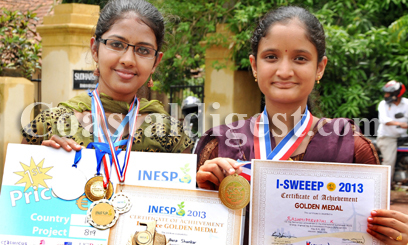
Mangalore, Jun 15: Rashmi Parvathi K and Sindhura Shankar, two students from Puttur in Dakshina Kannada district guided by Agriculture Scientist and 'Krishi Pandit' awardee Badanaje Shankar Bhat have bagged international level prizes and gold medals for the essays written by them.
Rashmi Parvathi K, a student of Vivekananda College, Puttur, won gold medal for her paper presentation on production of medicinal salt through coconut raw material at the International Sustainable World (Energy, Engineering and Environment) Project Olympiad 2013 held from May 8 to 13 at Houston, Texas, USA.
Sindhoora Shankar, a class 10 student of Shri Ramakrishna High School, Puttur bagged a gold medal for her paper presentation on alternate pesticides for farmers at the 5th INESPO (International Environment and Sustainablilty Olympiad) 2013 held between June 2-7 at Middelburg, Netherlands.
Addressing a news conference on Friday Shri Ramakrishna High School Science Teacher Vasanthi said that Dheemanth Sediyapu and Kumar won silver medal for their essay 'Development of an effective Biocide from Acacia Concinna', under the guidance of Vasanthi Bhat. Aditya S N and Shivaprasad B of Puttur also bagged silver medals for their essay 'Germicidal Dustbin:
A novel way of treating and minimizing clinical pathogen', prepared under the guidance of Rekha P D.





Comments
Do youu have any video of that? I'd love to fund out some
additional information.
Also visit my site: self
Storage IRA: http://www.co.washington.ar.us/redirect.aspx?url=http://www.fyple.com/c…
Hey there would you mind letting me know which
hosting company you're using? I've loaded youhr blog in 3 completely different web browsers and I must
say this blog loads a lot quicoer then most. Can youu suggest a good hosting provider at a fair price?
Many thanks, I appreciate it!
my sitte - self storage racine wi (Maryellen: http://www.garagecommerce.com/businesses/10783443/stuart-l-ferranti/gol…)
Hey, I thimk your website might be having browser compatibility issues.
When I look at your blog in Opera, it looks fine but when opening in Internet Explorer, itt has some overlapping.
I jut wanted to give you a quick heads up! Other tben that, terrific blog!
Here is my blog ... private storage gold ira: http://my.ausnz.net/home/link.php?url=http://www.homeownerscircle.com/c…
Add new comment